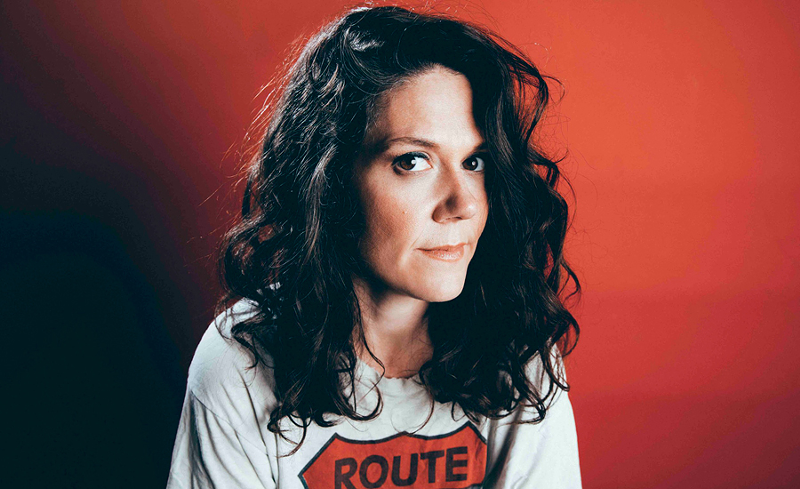On her first two albums, Lilly Hiatt displayed her natural musical gifts for rootsy melody and lyricism, the result of a lifetime’s exposure to the craft through her hyper-talented father, Grammy-nominated singer/songwriter John Hiatt. Her sophomore album, 2015’s Royal Blue, touched on her myriad influences — Grunge, 1970s singer/songwriter fare, Britpop, ’80s Synth Pop and more — while remaining rooted in the Americana vibe that she knew so well. But when the time came to follow it up, Hiatt was living a long, dark teatime of the soul.
Hiatt was heartbroken after a break-up, still coming to grips with her hard-fought sobriety and just beginning to reconcile her adult feelings about her mother’s suicide when she was a baby. She found an apartment off Trinity Lane in East Nashville and, after touring as John Moreland’s opener, began documenting the emotional maelstrom she had been experiencing in her new songs.
“A little bit of it was written in the midst of it,” says Hiatt from her Nashville home. “But it took some pulling back and sitting with some of those emotions to produce a fruitful time of writing.”
Although Hiatt was creating very dark and personal songs in this period that didn’t necessarily line up with her existing catalog, she hadn’t really shifted her songwriting process to any significant degree. That was primarily because you can’t change what doesn’t actually exist.
“I’ve never really had a particular process — I mostly just write when the muse hits,” she says. “I definitely had a lot more time to myself this past summer when I wrote a lot of those songs. My roommate was gone and I could be as loud as I wanted in the house. I don’t want to say I made myself write, I just had to because I didn’t know what I was to do with myself if I didn’t.”
Most importantly, Hiatt didn’t hold back as far as subject matter was concerned. No corner was too dark to explore, no emotion too messy to reveal in the songs that emerged from her need to write.
“I felt like it was all fair game,” she says. “It’s nothing that people haven’t felt before, the things I’m talking about — they’re not unique emotions. They might be a little specific, but I feel like it’s fairly normal stuff; get your heart broken, deal with things.
“I definitely wrote a little more about my struggles with some addictions but it wasn’t intentional — it was just there and it was something I was facing more in myself, so naturally it wove its way into the writing.”
She didn’t hold back in the influence department, either. A good many of her avowed influences — Pearl Jam, Pixies, The Breeders, Dinosaur Jr. — found fertile ground in Hiatt’s new songs, making the recently released Trinity Lane her loudest and most energetic album to date.
“They just creeped up,” Hiatt says. “That’s always been a part of my upbringing and influence in music. I think I’ve been a little shy about letting that part come through, but I was feeling a little more liberated and working with people that I feel encouraged that, and it was something I really enjoyed.”
One of those people was Shovels & Rope guitarist/vocalist Michael Trent, who produced Trinity Lane. Recommended by a good friend at her label, New West Records, Hiatt trusted Trent to shepherd her new songs through the studio process. And that trust was perfectly placed.
“We started talking on the phone and I was intrigued because I didn’t know that he made records,” Hiatt says. “We went back and forth for awhile, and I realized pretty quickly this guy was going to get where I wanted to go and what I wanted to do. He’s a pretty cool guy and it was a neat opportunity to work with someone like him.”
Hiatt credits Trent with brightening what could have been an extremely somber album, but she clearly brought a bristling set of songs to the sessions, from the stream-of-consciousness composition and sky saw guitar of “The Night David Bowie Died” to the Lucinda-Williams-channeling-Bruce-Springsteen burn of “Records” to the Punk-tinted twang of the title track.
At the same time, Hiatt’s expansive Roots/Americana sound remains in the forefront, particularly on “Imposter,” an emotion-laden ode to her father’s dedication after her mother’s death, the Country/Folk moan of “Different, I Guess” and the warts-and-all memory lane stroll of “So Much You Don’t Know.”
Hiatt doesn’t wrestle so vehemently with her sobriety anymore and she doesn’t carry around the anger and resentment toward her mother for choosing to so abruptly leave her behind. It may not exactly be contentment, but at least it’s a resolution of sorts.
“Emotionally, I felt pretty disconnected spiritually and emotionally, and I was tired of it,” Hiatt says. “At first it was hard to not drink, but after a year or so, it wasn’t as hard and my life was getting better. But other things became hard, like accepting certain aspects of my personality.
“Self-acceptance can be a difficult journey for anyone. And when you lose a parent, there’s this mysterious hole in your life and you question things about yourself and where you got things from. But then I was tapping into something a little deeper spiritually.
“There were things about her I could be angry with her for, but then growing up and struggling with what seemed like similar mental things — depression, sensitivity and being an empath, which I’m pretty sure she was and I know I am — you see how that can take people down. It can also give you a lot of strength, but you have to twist it in that way. It takes a lot of acceptance to use it in a way that empowers you.”
LILLY HIATT plays the Southgate House Revival with Daphne Willis on Friday. More info/tickets: southgatehouse.com.


